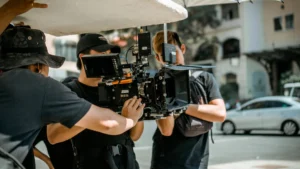How to get better Filmmaking?

An All-Inclusive Handbook for Future Directors
Filmmaking is a craft combining technical mastery, visual composition, aural design, and narrative to realize ideas. Whether your goals are to produce engaging YouTube videos, direct feature films, or shoot documentaries, improving your filmmaking requires both hands-on experience and creative insight.
Regardless of your degree of expertise, this site provides learning methodologies, useful advice, and doable ideas to help you improve your filmmaking abilities.
1. Perfect the Foundations of Storytelling
Every great film is fundamentally based on an engaging narrative. If the plot is poor, your film will fall flat regardless of the sophistication of your camera or editing program.
- Learn the foundations of the three-act structure—setup, conflict, and resolution—then tips.
- Create realistic characters with well-defined goals, skills, and weaknesses.
- The key is conflict: Narrative is driven by conflict. Find the primary conflict in your narrative and center on it.
- Blake Snyder’s Recommended Reading: Save the Cat! Narrative by Robert McKee
2. See Movies Critically
Watching films is study as much as fun. Study the movie rather than just enjoying it.
- Look for elements of composition, lighting, and camera motions in the cinematography.
- Edit: See how timing influences suspense and scene change.
- Listen to background soundtracks, sound design, and ambient noise.
- Actors’ emotional expressions and how the conversation develops character will be evident.
- Over time, keeping a film diary where you note observations and lessons discovered may be very beneficial.
3. Regular Practice Shooting
Like any other trade, filmmaking becomes better with experience. You will become better the more you shoot.
- Exercises: Practical 30-second movies. Spend thirty seconds telling a narrative. This will improve your narrative efficiency.
- Scenes without dialogue: Try telling a tale only using images and sounds.
- Reproduct a scenario. Recreate a well-known scene to learn the original directors’ technique.
- Should you lack a DSLR or mirrorless camera, use your smartphone. Working on composition, movement, and narrative should take the front stage.
4. grasp lighting and cinematography
The cinematic experience of an ordinary-looking video is created by its cinematography. Crucially, I have knowledge of camera operation, shot composition, and lighting manipulation.
- The rule of thirds, leading lines, and symmetry—framing and composition—will help you become comfortable.
- High-angle, low-angle, tracking views; over-the-shoulder, etc. camera angles
- Learn three-point lighting, natural lighting, and how shadows could evoke mood.
- Good visual style results from deliberate choices. Using a simple LED light kit creatively can help your images to be much better.
5. Learn post-production and video editing
The tale really comes together in this area. It polishes the raw video as a whole, modulates pace, and accentuates feeling.
- Learning Software: Filmora, iMovie, Beginner-friendly
- From intermediate to advanced, Adobe Premiere Pro, Final Cut Pro, DaVinci Resolve
Skills for Editing Development:
- Cutting on action gives transitions smoothness.
- For immersion, stack conversation, music, and ambient noises.
- Grade and color correction improves visual uniformity and mood.
- Online classes and tutorials may teach you the software as well as the creative approaches behind editing.
6. Create a Cooperation Network
Rarely is filmmaking a lonely activity. Often, you will need a group of colleagues—writers, performers, sound designers, and editors.
- Join local filmmaking clubs or internet forums (such as r/filmmakers on Reddit).
- Visit networking gatherings and film festivals.
- Help on sets to meet people and get experience.
- Developing solid bonds might lead to fresh project possibilities and educational chances.
7. Research Film Theory and History
Knowing the history of movies enables you to appreciate the development of the artistic medium and what makes a movie ageless.
Important Movements to Research:
- German Expressionism
- New Wave in France
- Neorealism from Italy
- Fresh Hollywood
See how legendary filmmakers like Stanley Kubrick, Akira Kurosawa, and Alfred Hitchcock stretched limits and changed narrative.
8. Grow from Mistakes and Get Comments
It’s OK if your first few films are not great. One gains from honest criticism and self-evaluation.
- Share your work via mentors, forums, or pals.
- Get specific comments like “How was the pacing?” “Did the characters feel real?”
- Think back on what worked and what didn’t, then use those ideas in your next endeavor.
Development happens iteratively. Even seasoned directors grow continually from mistakes.
9. Attend Online Workshops and Classes
Online, there is a lot of filmmaking expertise available. Structured courses may accelerate your learning above that of trial and error by itself.
MasterClass (Martin Scorsese, Werner Herzog, etc.) is the recommended platform.
Courses
- Skillshare
- Coursera
- YouTube channels include Every Frame a Painting, DSLR Video Shooter, and Film Riot. Channels include
- Whether it’s cinematography, directing, scripting, or editing, search for classes that fit your objectives.

10: Create Passion Projects
Making films you love will ultimately help you develop the most. Passion projects inspire you to conquer obstacles, highlight your flair, and spark the imagination.
Concepts:
- Short films
- Television documentaries
- Video of Music
- Experimentally based visual storytelling
Real creativity may still show even if your budget is restricted or you have limited tools.
Conclusion
Developing as a better filmmaker is a path of inquiry, tenacity, and experience. Though there is no fast cut to expertise, you will hone your work over time by regularly studying, trying, and producing. Don’t wait for the ideal circumstances or gear; simply start shooting and develop along the way.
Five frequently asked questions, or FAQs:
1. Does attending film school help me to develop into a decent director?
Not inevitably. Many great filmmakers are self-taught, even if film school offers structure, mentoring, and networking possibilities. Online tools, exercises, and group projects may provide just as rich educational opportunities.
2. For first-time directors, which camera is best?
Excellent narrative transcends tools in importance. But when handled creatively, entry-level DSLRs (such as Canon EOS Rebel series), mirrorless cameras (such as Sony Alpha a6400), or even cellphones with manual settings may really work magic.
3. How long does one have to grow into a competent director?
No set chronology exists. Many ambitious directors begin creating great short films between one and two years of constant instruction and practice. The secret is commitment and ongoing development.
4. How can I create films with either a cheap or no budget?
Emphasise story-driven projects, utilize natural lighting, call friends to serve as cast and crew, and shoot on actual sites. Many classic independent films began with little money but great inventiveness.
5. As a novice, which editing program should I start with?
Start using easily navigable apps like Filmora or iMovie. Once you feel confident, you may explore more sophisticated choices, including DaVinci Resolve, Final Cut Pro, or Adobe Premiere Pro.